How to Spot-Check Your PPC Campaign – and Your Provider
If you suspect that half the money you spend on paid search marketing is wasted but you don’t know which half, this piece was written to help you figure out which. By no means is it an advanced guide, especially with all the advancements and changes taking place this very moment on multiple paid search platforms.
Throughout business school, one of the many die-hard rules of business, regardless of industry or region, was “If it’s not your core competency, outsource it to someone whose core competency it is.” Easy enough to understand… if you’re a fashion designer, it’s likely that you’re not also a photographer, so it’s best to hire a professional photographer to get good pictures for your marketing, website and catalogue. Car dealers might trust the same photographer to capture the most enticing images of new cars in stock, while trusting another provider to put those images online in a way that sells. The realm of marketing itself is a combination of art and science, one which is usually mastered only by those who have chosen to dedicate themselves to having that particular competency; hence the saturated industry of marketing companies and advertising agencies on all scales (and the lone wolves, of course). The risk we all run, however, from fashion designers to Ford dealers to farriers, is that the very reason we outsource is the exact same reason we may find ourselves handicapped in knowing if we’re getting what we’re paying for. Unless you’ve been through several providers of an outsourced service, there isn’t even a frame of reference against which you can compare your level of satisfaction.
Let’s go back to the 5 W’s from grammar school – because that’s how easy it can be to spot-check your PPC campaign:
- Who – Do you know exactly what audience is your target? Regardless of on which platform you engage in paid advertising, there is a way of targeting those who are most likely to respond to your ad(s). On a more traditional search platform like Google, your keyword intelligence strategy is king; if you’re not fully confident in knowing you have a keyword intelligence strategy, it’s time to start asking questions. Are your ads showing only for those searching for them or are they on the display

Florida Honda Dealer Facebook Ad Showing in NJ network, perhaps on someone’s monitor states away, on a site that couldn’t be less relevant to your product? If you’re advertising on Facebook, you have both the advantage of the platform’s traditional behavioral target marketing and some new, more advanced targeting as Facebook has released features that are more enticing to digital marketers. If you’re running an ad on Facebook, your provider should be able to tell you precisely the demographics, behavioral interests & activities as well as, of course, the location of your target audience. By the same token, Facebook is overhauling its own advertising platform as you read this, possibly even removing marketing features that have been free to you all along. Did your provider tell you about those?
- What – What unique, value-added message are you conveying through your ad(s)? The longer the purchasing cycle of your product or service, the stronger your value proposition has to be in that ad. The same rule applies to “large ticket” items; so if you’re a car dealer, for instance, you or your marketing provider need to use all resources available to create an ad that will truly engage people with your brand. Every Nissan dealership has Altimas and Maximas, and the corporate offers are the same dealer to dealer. Are you showing your audience something that sincerely makes you different from your competitors? Maybe your dealership offers free maintenance for a year with every purchase. Maybe your photography studio offers lifetime archiving and digital protection for your images. Is your unique value in the ad copy strong enough to sway a consumer’s mind? It’d better be…
- When – No grass grows under the feet of marketing, the technology of which has better than ever enabled marketers to know more precisely when consumers are most receptive to your paid proposition. Without your promotions being accessible from a mobile device, you’re failing to reach between 60%-70% of your mobile customers[1]. Is your ad appearing only on desktop computers when people are at home? Is your average ad position high enough to make it onto mobile devices? Or are your marketing efforts finely-honed to appeal strongly to the activity and demographics of mobile users?
- Where – The inclusion of this “W” is almost a shame. In this day and age, there are those who still carelessly fail to use any geotargeting features of an advertising

CA Chevy Dealer Google Display Ad on eBay Product Listing in NJ platform and, as a result, waste valuable brand exposure opportunities in places from where they would never draw customers. Beyond the geographic faux pas is not knowing whether your ads are showing on the right types of pages. General search results are a no-brainer; but if your ads are on a display network or “search partners,” for example, your ads for product A could be falling in front of the eyes of someone interested only in product Z. No matter where your ads appear, eventually you want interaction from that part of the audience that’s at least within your purchasing funnel, and hopefully toward the bottom of it near a higher likelihood of conversion.
- Why – Leads? Brand exposure? Special event or sale? New milestone or award? It’s possible you didn’t know that paid search marketing, aka SEM, aka PPC, can be specifically tailored to any one of your individual goals, and there’s a different type of paid search marketing that’s better suited to each one. Some may have a higher cost-per-click, while some may deliver thousands of impressions at little cost… the important thing is that you know exactly what you’re getting, and that you’re getting what you think you’re paying for.
Most of all, be sure the reporting you receive is accurate and comprehensive; on Google

AdWords, for example, the bare minimum reporting requirements are the number of clicks, the number of impressions, and overall amount of money spent. While many providers make pretty dashboards and screenshots from “custom” reporting, it’s actually in your best interest to request unaltered screenshots directly from your AdWords dashboard. Furthermore, it’s solid Google policy that, if you’re paying a management fee (which is not uncommon at all, up to 20% and higher based on performance), you have to be aware of it and agree to it in writing! Your provider is not allowed to take any of the funds you’ve allocated for paid search advertising and spend them anywhere else – nor pocket them.

Hence, this “vignette” of a guide will hopefully find its way onto the screens that need it the most. By far, this is no example of advanced training material; simplistic as it may seem to SEOs, PPC providers and other marketers, there remains a strong enough audience to warrant such a recap. Inspired by such a high frequency of finding basic but critical mistakes, this piece can hopefully enable those who write out checks every month in blind faith to “spot-check” their paid search campaigns’ performance and management. In 2013, I still find such elementary mistakes in campaign management and reporting, across all industries and platforms, that are wasting clients’ money, losing customers and sales, and even leading to poor branding.










